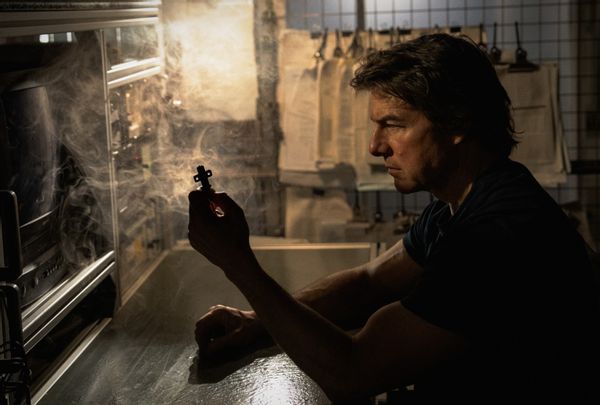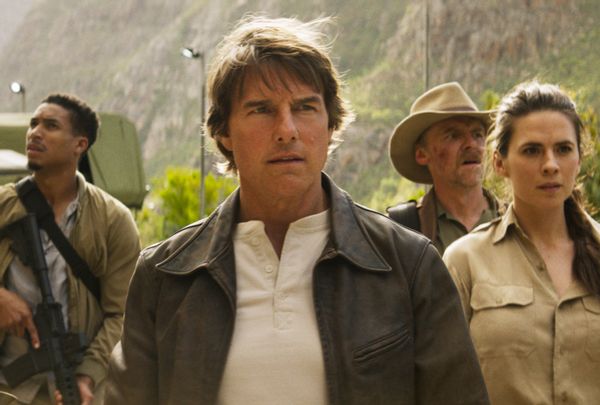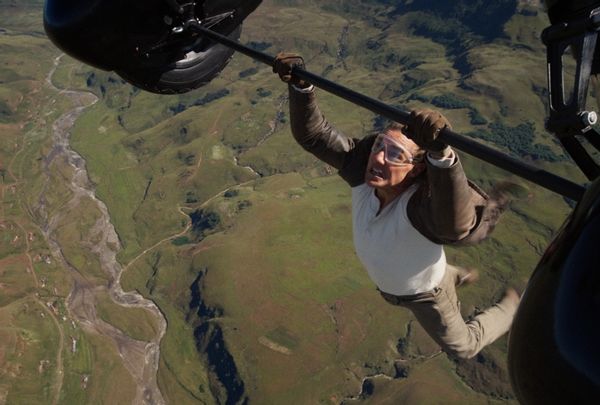Tom Cruise’s real “Mission: Impossible”: Save the movies, save the world

Tom Cruise is a lot of things: movie star, Scientologist, popcorn enthusiast, the worst nightmare of an IKEA living room section. But one thing he’s not, no matter how hard he tries to be, is God. Though you wouldn’t know that by watching “Mission: Impossible - The Final Reckoning,” the latest and potentially last film in the long-running “Mission: Impossible” franchise.
For 35 years, Cruise’s super spy Ethan Hunt and his rotating, crackerjack team of rogue agents have been saving the world from annihilation time and time again, skirting death by a hair each time. Ethan’s ability to thwart his enemies at every turn through sheer will and cunning is bested only by his unyielding compassion. If he cares for someone, he will go to the far reaches of the Earth to save them. Sure, these movies might have plenty of silly, rubber masks and more explosions than you can count. But beyond all the visual shock and awe, it’s Ethan and his cohorts' bleeding-heart humanity that makes the “Mission: Impossible” films so affecting. Even at the end of the world, these characters will sacrifice themselves for — as the Impossible Mission Force slogan says — those they hold close and those they’ll never meet.
The “Mission: Impossible” films make us believe that our heroes, as human as they are, will always save the day. They can’t let us down. It would destroy every conviction we hold. The belief in our invisible savior, working tirelessly to defend our planet, is so sincere that it defies reason. It is a faith in a higher power.
Sitting down in a theater and watching “Mission: Impossible - The Final Reckoning,” one can’t help but realize Cruise and Ethan Hunt really aren’t so different. Cruise is an agent all his own, performing the impossible mission of trying to save cinema and unite a people divided. To do it, he’ll risk his life performing death-defying stunts just so their spectacle and authenticity can be part of the draw that gets butts in movie theater seats. We could sit around all day and debate the moral nature of the actor himself, but the fact is, Cruise’s intent is noble. He believes in the power of film and the strength we get from the communal aspect of worshipping at the movie house. He considers cinema to be religion, and the level of entertainment that something like a “Mission: Impossible” movie can provide to be biblical scripture. And in “The Final Reckoning,” Cruise positions Ethan Hunt as a Jesus figure, predestined from birth to save humanity through extreme personal sacrifice, mirroring the actor’s decades-long efforts to join together a broken world in the glow of the silver screen.
Maybe I wouldn’t be so tempted to evangelize if it weren’t for Cruise and director Chris McQuarrie’s ability to so presciently understand what the “Mission: Impossible” franchise can be. Throughout the last four films, this highly dynamic duo has transformed the series from frothy, high-flying, fast-running spy action to frothy, high-flying, fast-running, timely tales of social division. Decent cinematic espionage usually whips a collective cultural anxiety into a sugary sweet, fizzy concoction that sticks to its audience’s nerves like glue. We care so much about our heroes saving the day because they are the ones brave enough to go up against the forces of evil that keep us up at night. If they fail, we all lose. Hope is only as strong as a super spy’s resolve. When that wanes, what’s left for the rest of us?
 Tom Cruise as Ethan Hunt in "Mission: Impossible - The Final Reckoning" (Paramount Pictures/Skydance). That trust is its own form of faith. The “Mission: Impossible” movies do such a fantastic job of humanizing the inhuman — both the indestructible Ethan Hunt and the block of lean muscle and silicone that is Cruise — that they stand apart from almost all of their contemporaries. James Bond is too cold and calculating; Jason Bourne too complicated; Sherlock Holmes too British. We can relate to Ethan Hunt because he’s a somewhat regular guy who was placed into impossible circumstances, given a choice by the government to join the IMF or face life in prison after being framed for the murder of his wife. He’s as put-upon as the rest of us. Ethan is the picture of imperfection, and in his flaws, we see ourselves. To recognize yourself onscreen is a powerful feeling that Cruise and McQuarrie innately understand how to manipulate. Every hazardous stunt takes our breath away because we can’t bear to think about what will happen if it doesn’t turn out okay. The “Mission: Impossible” films make us believe that our heroes, as human as they are, will always save the day. They can’t let us down, they couldn’t. It would destroy every conviction we hold. The belief in our invisible savior, working tirelessly to defend our planet, is so sincere that it defies reason. It is a faith in a higher power.
Tom Cruise as Ethan Hunt in "Mission: Impossible - The Final Reckoning" (Paramount Pictures/Skydance). That trust is its own form of faith. The “Mission: Impossible” movies do such a fantastic job of humanizing the inhuman — both the indestructible Ethan Hunt and the block of lean muscle and silicone that is Cruise — that they stand apart from almost all of their contemporaries. James Bond is too cold and calculating; Jason Bourne too complicated; Sherlock Holmes too British. We can relate to Ethan Hunt because he’s a somewhat regular guy who was placed into impossible circumstances, given a choice by the government to join the IMF or face life in prison after being framed for the murder of his wife. He’s as put-upon as the rest of us. Ethan is the picture of imperfection, and in his flaws, we see ourselves. To recognize yourself onscreen is a powerful feeling that Cruise and McQuarrie innately understand how to manipulate. Every hazardous stunt takes our breath away because we can’t bear to think about what will happen if it doesn’t turn out okay. The “Mission: Impossible” films make us believe that our heroes, as human as they are, will always save the day. They can’t let us down, they couldn’t. It would destroy every conviction we hold. The belief in our invisible savior, working tirelessly to defend our planet, is so sincere that it defies reason. It is a faith in a higher power.
In “The Final Reckoning,” McQuarrie and Cruise wrestle with just how easily blind faith can be exploited and controlled. Some months after the events of 2023’s “Mission: Impossible - Dead Reckoning Part One,” the all-knowing, oracular artificial intelligence program called the Entity has all but taken the world into its digital grasp. The Entity can mass-manipulate truth on a global scale, gaining control over humanity by tricking them into believing its narratives, which are mapped to the detail and chosen based on their probability to successfully sow chaos. While most “Mission: Impossible” films depict the public unaware of the catastrophic events the IMF is preventing right under our noses, “Final Reckoning” finds society in the throes of collapse. Martial law is in effect, city streets are filled with dissension in favor of AI and the Entity is quickly gaining control of the world’s nuclear arsenal. Time is ticking down faster than ever, and in these films, the clock must never reach zero.
 Tom Cruise as Ethan Hunt, Greg Tarzan Davis as Degas, Simon Pegg as Benji Dunn and Hayley Atwell as Grace in "Mission: Impossible - The Final Reckoning" (Paramount Pictures/Skydance)
Tom Cruise as Ethan Hunt, Greg Tarzan Davis as Degas, Simon Pegg as Benji Dunn and Hayley Atwell as Grace in "Mission: Impossible - The Final Reckoning" (Paramount Pictures/Skydance)
Want a daily wrap-up of all the news and commentary Salon has to offer? Subscribe to our morning newsletter, Crash Course.
But this time around, things are different. McQuarrie and co-writer Erik Jendresen have built a world that looks frighteningly similar to our own, where ChatGPT is so prevalent in high schools and colleges that students’ ability to create and think for themselves is rapidly hemorrhaging. Google’s (often incorrect) AI overview is the first thing users see when they search online. People are already happy to let this technology think for them. And yes, the current versions of this AI are dubious, unreliable and artless. But is it so far-fetched to imagine a reality where they’ve become more refined? It’s not just that the tech is changing rapidly; it’s that there are those who want it to change even faster, who gain joy from the mere idea that AI could be such an inextricable part of our lives that anyone with a creative mind is put out of a job. Take a look at the social media replies of any journalist posting about being laid off, and you’ll find that their dejection is like a beacon to the vultures, waiting to pick at the remains of an already desolate media landscape.
In its study of AI, “The Final Reckoning” is unapologetically bleak. McQuarrie and Jendresen have concocted a dour world where normally faceless AI devotees have become public proselytizers. They stand before news cameras, embracing armageddon, preaching about how the Entity will deliver humanity to redemption. In our modern dystopia, fire and brimstone have been replaced by ones and zeroes. Matters have become so dire that the president, Erika Sloane (Angela Bassett), is considering a tactical nuclear strike that will vaporize hundreds of thousands of souls around the world, just to get a jump on the Entity’s growing command of atomic forces. There is no winning unless Ethan and his team can retrieve the Entity’s source code from a submersible at the bottom of the sea and trap it inside a secure server, a mission more impossible than any that have come before it.
 Nick Offerman, Charles Parnell, Angela Bassett, Mark Gatiss and Janet McTeer in "Mission: Impossible - The Final Reckoning" (Paramount Pictures/Skydance). Cruise’s ambitions might not be quite so perilous, but they are equally as daunting. How can you convince an audience with their phones hermetically sealed to their hands to put away their devices and care about this sprawling, capital-M movie playing in front of them? If so much of humanity is already content with AI, will the warnings of a “Mission: Impossible” so supremely critical of AI even track?
Nick Offerman, Charles Parnell, Angela Bassett, Mark Gatiss and Janet McTeer in "Mission: Impossible - The Final Reckoning" (Paramount Pictures/Skydance). Cruise’s ambitions might not be quite so perilous, but they are equally as daunting. How can you convince an audience with their phones hermetically sealed to their hands to put away their devices and care about this sprawling, capital-M movie playing in front of them? If so much of humanity is already content with AI, will the warnings of a “Mission: Impossible” so supremely critical of AI even track?
How could you not be filled with the spirit, sitting in front of the big screen, watching what may be the last film of one of cinema’s greatest franchises strip itself of the silliness it has worn like a rubber mask from the beginning to get real with its audience?
But like the adage goes: If you build it, they will come. Sitting in a packed theater this week and watching all phone screens not just go dark, but stay dark for the nearly three-hour runtime of “Dead Reckoning” was a rare sight not lost on me. People want to be dazzled by the spectacle of a feature so grand that they can’t help but be awestruck by the magnificence of its existence. There is real magic to what Cruise and McQuarrie pull off with this film’s harrowing stunts, which include two of the franchise’s most jaw-dropping set pieces. Ethan’s journey to the bottom of the sea is arduous and filled with barriers. But by the time the dialogue-free, centerpiece underwater sequence brims with Max Aruj and Alfie Godfrey’s droning score, popcorn shuffling stopped. Soda sipping ceased. The occasional whisper subsided. It is, after all, rude to make noise during a worship service.
Ethan’s noble quest to save humanity reflects Cruise’s genuine belief that humanity is united by the art they can see on the big screen. This decade alone, Cruise excitedly backed the limited, mid-pandemic theatrical release of “Tenet,” extolled the virtues of the theatrical experience in a pre-recorded message playing before “Top Gun: Maverick,” and made a PSA about the evils of motion-smoothing televisions. He’s a guy who wants people to experience the art of filmmaking as it was intended to be seen, every time. He delivers his sermons with such certitude that it’s easy to forget that his actual religious views might be a little precarious (to say the least). And in “The Final Reckoning,” Cruise even has a line about how this fight against AI — and, by extension, Cruise’s fight for the art of cinema through its most mainstream blockbuster form — has become free of ideologies and dogma. What matters is protecting a force like cinema that brings humans together, not emboldening the technology that keeps us apart. Sometimes, you’ve got to hammer that importance into someone — quite literally, in the case of Ethan clobbering a knife-wielding assailant defending the Entity, saying, “You spend too much time on the internet!”
 Tom Cruise as Ethan Hunt in "Mission: Impossible - The Final Reckoning" (Paramount Pictures/Skydance). Though Cruise loves making movies, he doesn’t enjoy being their preordained salvation. (Jesus didn’t ask to be born into his fate either!) When questioned about his feelings on being deemed “the last movie star” by people who are nostalgic for a time when the kind of films Cruise makes were much more prevalent, Cruise responded, “I don’t want to be.” He’s not pleased about the fact that the industry is in such uncertain shape that it’s not entirely inconceivable that he could be the last great movie star. No one who really loves working in this business would be, no matter how devoted they are to the religion of cinema. Yet, Cruise feels he has no choice. He must jump off cliffs on a motorcycle. He simply has to hang from a plane in mid-air. He has taken up the mantle for our greater good, just as Ethan Hunt chose to.
Tom Cruise as Ethan Hunt in "Mission: Impossible - The Final Reckoning" (Paramount Pictures/Skydance). Though Cruise loves making movies, he doesn’t enjoy being their preordained salvation. (Jesus didn’t ask to be born into his fate either!) When questioned about his feelings on being deemed “the last movie star” by people who are nostalgic for a time when the kind of films Cruise makes were much more prevalent, Cruise responded, “I don’t want to be.” He’s not pleased about the fact that the industry is in such uncertain shape that it’s not entirely inconceivable that he could be the last great movie star. No one who really loves working in this business would be, no matter how devoted they are to the religion of cinema. Yet, Cruise feels he has no choice. He must jump off cliffs on a motorcycle. He simply has to hang from a plane in mid-air. He has taken up the mantle for our greater good, just as Ethan Hunt chose to.
How could you not be filled with the spirit, sitting in front of the big screen, watching what may be the last film of one of cinema’s greatest franchises strip itself of the silliness it has worn like a rubber mask from the beginning to get real with its audience? The espionage terror the “Mission: Impossible” films have cooked up has come to reap. What was once far-fetched is now our reality. Tech will very well be our downfall one day. But under the dark of the theater, we’re afforded the rare chance to remove ourselves from that digital umbilical cord and experience a film as it’s meant to be seen, alongside people who want to do the same. Call it movie magic. Call it religion. Just don’t call it the end.
salon




